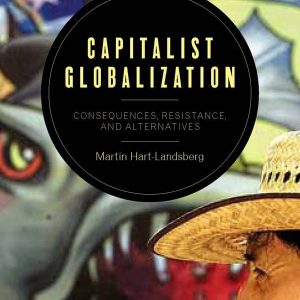Capitalist Globalization: Consequences, Resistance, and Alternatives
THURSDAY, 20 FEBRUARY 2014
WRITTEN BY DOMINIC ALEXANDER
Capitalist Globalization shows that neoliberal policies have not succeeded in bringing prosperity to the world’s population, but rather have entrenched existing inequalities
Martin Hart-Landsberg, Capitalist Globalization: Consequences, Resistance, and Alternatives (Monthly Review Press 2013), 223pp.
The ideal for any individual capitalist is to pay their own workers the very least possible, usually, but not always, compatible with basic reproduction of life. This should happen at the same time as other capitalists’ workers are being paid enough to afford to buy the products of the first. Since each wants to be the one who pays his workers the least, this equation is one of the central contradictions that leads to periodic crises in capitalism. So long as this system exists there will be pressure to make the impossible conundrum work. Of course ways can be found to fix a particular crisis for a limited time, but sooner or later the process will create another crisis, for which another temporary solution must be found.
This is, in schematic form, what has been happening in the world economy during the era of ‘globalisation’, usually dated from the late 1970s to the present. Neoliberalism, the ideology accompanying the present wave of globalisation (there have been others in the past), presents the process in ideological terms as the unleashing of the power of the ‘market’ through the adoption of free trade agreements, labour market ‘liberalisation’, and other such mechanisms designed to strengthen the hand of capital against labour. Martin Hart-Landsberg gives us a very clear account of the realities of globalisation, as well as a withering critique of the neo-classical economics behind it, in accessible and succinct form. There is even some debunking of key elements of classical economics, such as Ricardo’s theory of comparative advantage. The latter is vital to the argument that, in a context of international free trade, national economies will specialise in certain products for their prosperity (pp.74-80). Like so many nostrums of bourgeois economics, the proof of this theory rests on a series of assumptions requiring an idealised state of affairs that never holds true in practice.
Hart-Landsberg draws a sharp distinction between free-market ideology and its practice; the actual content and impact of the economic policies and trade agreements justified by the ideology in the last forty years. Neoliberal ideology in its popular guise tends to present ‘free trade’ as the natural state of affairs, which, if only governments would release their economies from artificial statist fetters, would provide a bounty of prosperity and growth. Statisticians and insider-economists have provided the numbers that regularly purport to show each and every trade deal in prospect increasing GDP and the volume of trade by so many millions, and creating new jobs by however many further tens of thousands…

Comments are closed.